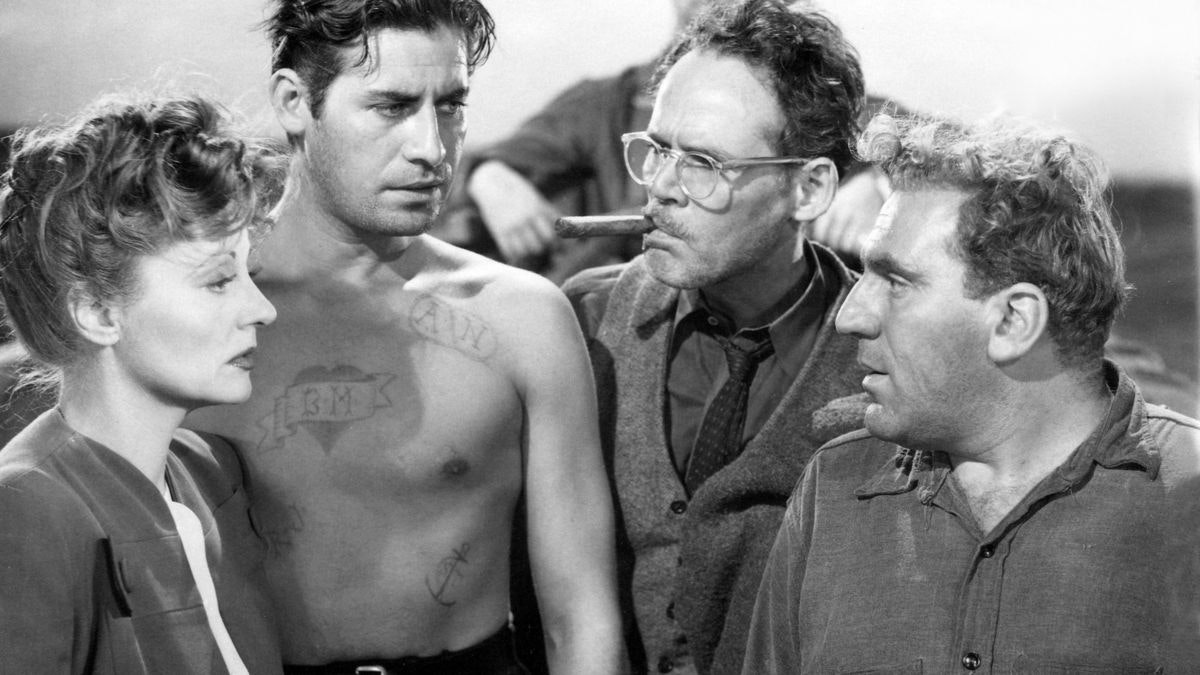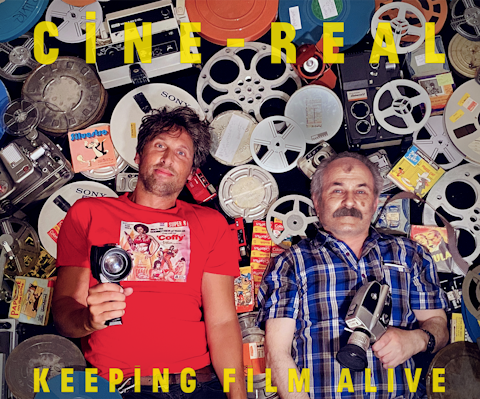LIFEBOAT (1944)
LIFEBOAT (1944)

Made right during the middle of WWII, Lifeboat was the first of Alfred Hitchcock’s experiments with movies set in a single enclosed space: a lifeboat after a shipwreck. It was filmed in the studio for maximum focused artificiality. The movie starts off in an uncomfortably didactic fashion (John Steinbeck did the original story, and his heavy hand can sometimes be felt), but Lifeboat is actually much more complicated than it first appears. Its emphasis on moral debates in dialogue can seem a little dry, but Hitchcock’s shifting sympathies guarantee our guilty involvement with the characters until he builds to a climax of intellectual and spiritual excitation.
It starts with a ship going down, and we see various objects floating away: a copy of The New Yorker, playing cards, wooden spoons, a chessboard, and finally a corpse. With this sobering sight, Hitchcock switches to a wider view of the detritus, but he chokes off any easy emotions of pity for disaster with a cut to his film-long joke: glamorous Tallulah Bankhead sitting alone in a lifeboat. Bankhead, a flamboyant theater star who never made much of a Hollywood impression, is granted a peculiar showcase here, her only decent one. Bankhead’s eyes are inexpressive, and the camera doesn’t really like her, but Hitchcock does and we eventually warm to her; like many theatrical personalities, she does most of her acting with her (comically low) voice. Her Constance Porter is a journalist, and she whips out a camera to film the survivors as they climb into the boat (a pointed bit of self-criticism from film-mad Hitchcock). “Look, that’s a perfect touch!” she cries, trying to take film of a baby’s abandoned bottle. This enrages Kovac (John Hodiak), the resident socialist, and he throws her camera overboard (the first in a long line of things Connie loses throughout the film).
As Hitchcock introduces the other characters, we can palpably feel his impatience with most of them. There’s low-class Brit Stanley (Hume Cronyn), natty capitalist C. D. Rittenhouse (Henry Hull), dopey Gus (William Bendix), reformed pickpocket Joe (Canada Lee), pretty nurse Miss MacKenzie (Mary Anderson), Mrs. Higgins (Heather Angel), a mad woman with a dead baby, and Willy (Walter Slezak), a corpulent Nazi. They discuss whether or not to throw Willy overboard; Kovac wants to pitch him out right away, but Connie and Rittenhouse argue in his defense, citing the laws of democracy and the precepts of Christianity. Hitchcock gets in a nice dig against racism when Joe, who’s black, quietly asks if he gets to vote on the matter. Joe, who is devoutly Christian, says a prayer in the dark of night (a beautiful shot), and Hitchcock balances his faith and dignity with Willy’s obvious craft and cunning. Meanwhile, Mrs. Higgins keeps flipping out. Though her scenes are handled with gravity and tact, when Willy yawns at her stagy anguish, we can’t help but feel that Hitchcock is yawning too.
Intellectually, we know we’re supposed to be horrified by Willy’s callousness, the same callousness we’re supposed to find amusing in Connie. Hitchcock subverts these expected responses so that we actually loathe Connie at first and side with Willy’s no-nonsense strength. The yawn is the first time we’re made to identify with Willy, which implicates us in his treachery later on. Hitchcock never puts his audience at a distance from his characters; we’re always being confronted by ourselves and our attitudes because of his masterful manipulation of various points of view. His serial killers, like Bruno Anthony and Norman Bates, are always the most attractive, sympathetic characters in his films. That’s why Willy (and Nazism itself) is given its fair shake, which is what makes Lifeboat so disturbing. What film today would dare to hint at anything positive in fascism, even if it’s just to strengthen a case against it? Yet Hitchcock doesn’t even really make that expected case. He’s above such things; in Lifeboat, he’s hunting bigger, cosmic game. There’s no playfulness here and precious little humor. This is a serious, at times self-serious movie (though the director’s cameo, a newspaper ad for diet pill Reduco, stands with his bus-misser in North by Northwest as his most amusing film appearance).
Gus and his gangrenous leg take over the film for a while, and Hitchcock has Bendix overplay his dumb-lug persona. Hitch emphasizes everyone’s unpleasant condescension to this thickheaded fool; his drunk scene while he waits for them to cut his leg off is painfully indulgent. The actor (and character) is so unbearable that our responses are complicated yet again after Willy pushes him out of the boat (it’s suggested he did the same for Mrs. Higgins). When the others voice their outrage at his actions, Willy sounds seductively practical as he says that he was only doing a favor for the poor cripple (and a favor for the audience by getting rid of Bendix). If Hitchcock had made a film set in a concentration camp, he would have probably focused on a very unattractive inmate, made us hate them by casting someone unlikable and hammy, made us feel guilty for hating this noble victim, and compounded that guilt by making the Nazi commandant a charming, charismatic fascist who gases children all day and then goes home to play Schubert with unerring skill and proper feeling. Evil, Hitchcock knows, is tempting. Which is why it proliferates and always will.
Hitchcock underlines the passenger’s mob ugliness when they kill Willy. (In his interview with François Truffaut, he called them “a pack of dogs.”) They don’t just throw Willy overboard: They beat on him wildly with their fists, and this charge is led by the gentle-featured Miss MacKenzie. It’s been revealed that she’s having an affair with a married man, and for a moment it seems that Hitch’s attraction/repulsion to lady-like sluts has gotten the better of him. However, it ultimately feels quite right that she should start the violence. And not “she of all people.” Hitchcock has taught us to distrust appearances.
We’re made to see that Willy’s “survival of the fittest” ethic is abhorrent and that the capitalism that’s made Rittenhouse’s fortune is this monstrous ethic taken to its financial extreme. Rittenhouse professes that he’s broken up about becoming part of a lynch mob, but he should be more broken up about the traits he shares with Willy. No one gets off here; everyone is guilty. Finally, Joe looks up to God for guidance, and Hitchcock, sensibly enough, is all for this. If you look at the world as deeply as Hitchcock does, religion really is your only answer. Like so many of his movies, Lifeboat is a deeply Catholic work.
Catholicism is linked strongly to the carnal, of course, and Hitchcock really goes for this subtext in most of his filmography, but only at moments here, such as the scene when Connie rubs the top of her foot over Kovac’s sole. Hitchcock eventually brings salacious Bankhead into focus as the film’s emblem. We get to like her character more as she’s stripped of her material accoutrements, in the same way Melanie Daniels is humanized by suffering in The Birds. Hitch is drawn to Tallulah’s wildness; too shy to celebrate it, he breaks it down, finds out its components, and likes what he sees (she doesn’t need to be punished too much, unlike the submissive Tippi Hedren). Connie has sympathy for the nurse’s troubles, she kisses Gus before his leg is cut off (a lusty, open-mouthed Tallulah kiss), kisses Kovac when they think they’re going to die (open-mouthed with a bit of tongue), and gives a definitive answer to Joe’s prayer: “How about giving Him a hand?” she asks.
This line, a platitude, really (“God helps those who help themselves”), is utterly resonant as a summing up of the film’s complicated points of view. It’s also a thunderbolt incitement for the Allied side in WWII, fighting a war that needed to be won. Perhaps the repetition of the young German getting on board and instantly pulling a gun on them is a little much (or maybe it just happens too abruptly). But Hitchcock has one more jolt up his sleeve in Rittenhouse’s reaction: “You can’t treat them as human beings, you have to exterminate them!” he says, echoing Nazi rhetoric. Hitch gives pagan goddess Connie the last word. Her lipstick retouched, ready to join the messy world again and live with Tallulah-esque gusto, she wisely refuses to answer the many slippery problems raised in the film and invokes God the father, the ying to her yang, who, she suggests, has a lot of explaining to do.
MORE INFO:
https://cinephiliabeyond.org/a...
